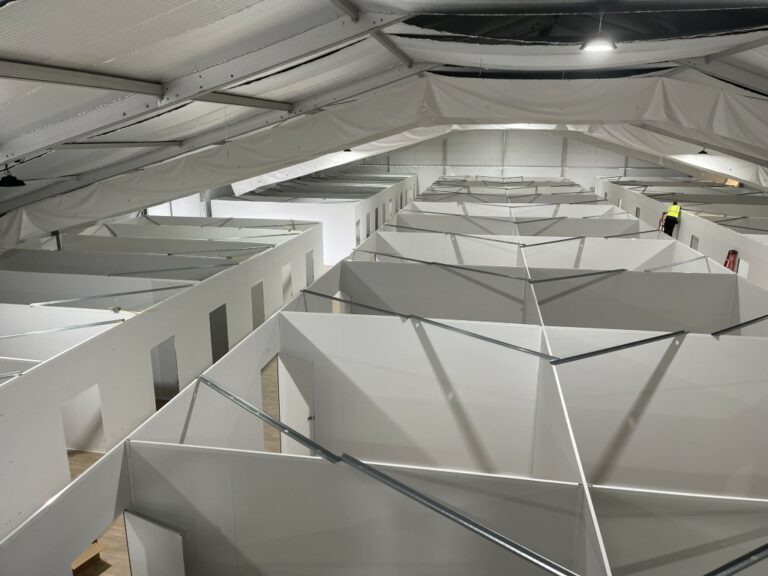If they are durable enough to provide safety and shelter for first responders and our military, as well as provide sanctuary for previous refugees coming to the US, they are surely sufficient, durable, and good enough for immigrants.
In recent times, the establishment of tent cities has emerged as a temporary solution to address the urgent need for shelter and safety for migrant populations. While concerns and criticisms have been raised regarding their suitability, it is essential to recognize the value and justification behind creating these spaces. By drawing insights from successful case studies, such as military deployments and Afghan refugee camps, we can understand the durability, safety, and sanctuary that tent cities can provide.
Durability and Infrastructure:
Contrary to popular belief, well-designed tent cities can offer durable and functional living conditions. One crucial aspect is the provision of heat and air circulation within the tents. By utilizing technology and engineering expertise, it is possible to ensure that these shelters are equipped with proper insulation and ventilation systems. This ensures that residents can withstand extreme weather conditions, including cold nights and scorching heat.
When comparing the strength, durability, and safety of modular, reusable ABS or aluminum-skinned walls such as SwiftWall modular systems versus drywall or plywood, it is important to acknowledge the misconceptions surrounding the perception of safety in tent walls. While not all encampments specifically use SwiftWall to divide the spaces, SwiftWall ABS or Aluminum skinned walls, are made from a durable, high-impact resistant material, and offer several advantages over traditional drywall. SwiftWall modular walls are known for their strength and ability to withstand external forces, making them more resistant to damage from impacts and general wear and tear. In contrast, drywall, being a gypsum-based material, or plywood is more prone to damage, dents, holes, water damage, and mold. SwiftWall panels are also easier to clean and maintain, as they are resistant to moisture and mold growth. Furthermore, SwiftWall panles provide better insulation having an insulative core, helping to regulate the temperature within the tent and improving energy efficiency. While the perception that tent walls are inherently unsafe may stem from a lack of understanding, it is crucial to recognize the strength and durability afforded by modular walls when properly designed and implemented.
Lessons from Military Deployments and Forward Operating Bases:
The military has long exemplified the successful use of tent cities in various operational scenarios. Military deployments often involve setting up temporary forward operating bases and camps in challenging environments. These camps are designed to provide essential amenities, including adequate shelter, medical facilities, and logistical support. The lessons learned from military tent cities can be applied to the current immigration situation, emphasizing the importance of proper planning, infrastructure, and support services to ensure the well-being of residents.
Afghan Refugee Camps with the United States and Germany:
The recent evacuation of Afghan refugees and the subsequent establishment of temporary camps provide valuable insights into the value and justification of tent cities. In countries such as Germany and the United States, these camps have served as sanctuaries for displaced individuals, offering them safety and shelter until more permanent solutions are found. These camps have been equipped with basic necessities, including healthcare facilities, educational resources, and welfare support. By prioritizing the needs and dignity of refugees in these temporary spaces, these countries have demonstrated the value of providing a safe and secure environment.
Addressing Concerns and Providing Solutions:
While concerns have been raised regarding the remote location of tent cities and their impact on commuting, it is crucial to address these issues. Collaborative efforts between local authorities and humanitarian organizations can ensure that transportation services are provided to facilitate access to work and schools. Additionally, the establishment of community centers within the tent cities can offer social support, educational programs, and job training opportunities, mitigating some of the challenges associated with remote locations.
Conclusion:
Tent cities, when properly planned and executed, can serve as valuable sanctuaries, offering safety and shelter to displaced populations. Drawing lessons from successful case studies, such as military deployments and Afghan refugee camps, we can understand the durability and effectiveness of these temporary solutions. By prioritizing infrastructure, support services, and addressing concerns about location and access to resources, tent cities can play a vital role in providing immediate relief and support to those in need. As we continue to face global challenges related to migration, it is essential to recognize the value and justification of these temporary spaces, while simultaneously working towards long-term solutions that address the underlying causes of displacement.

